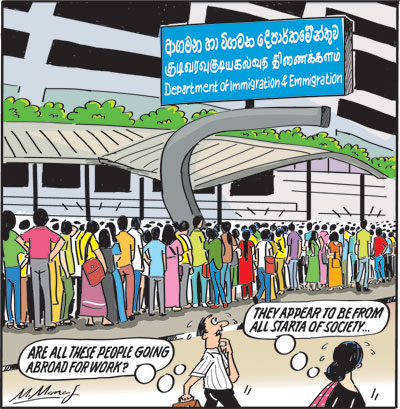Columns
Outmigration: Severe loss of human capital undermines economic development capacity
View(s):The global summit on human capital was held in Colombo recently at a time when the country was experiencing a severe erosion of human capital as never before. This unprecedented large exodus of workers would lead to the weakening of the country’s development capacity and be a setback to social development.
Six decades
The continuous exodus of skilled personnel over the past six decades is one of the serious setbacks to the economy and social development of the country.
Current outflow
Never before has there been such a large outflow of human resources as recently. A wide spectrum of personnel, from unskilled workers to professionals of many disciplines, are leaving the country.
Unskilled too
Apart from skilled workers, there is a substantial outflow of unskilled workers for training and work as factory workers, labourers, domestic workers and caregivers.
Professionals
In as much as there is a large outflow of workers as caregivers and domestic helpers, there are doctors, engineers, nurses, scientists, bankers, accountants, teachers and academics that are leaving our green pastures for greener pastures. The country has turned out to be one to leave rather than to live.

Health and education
Already, the dearth of many professionals is affecting the health services, university education, banks, accountancy services and the running of many private sector organisations.
Labour deficit
We are fast becoming a labour-deficit country from what was deemed a labour-surplus economy. The adverse impact of the outmigration is compounded by our fast-ageing population. Sri Lanka is said to have the fastest-ageing population in Asia. The proportion of the working-age population is decreasing owing to the ageing of the population and the exodus of younger persons of working age.
Earlier
Since the 1950s, there have been several waves of outmigration of skilled personnel, such as doctors, engineers, scientists, academics and other skilled personnel. This has been one of the most serious drawbacks to the economy.
Had these professionals stayed behind, the country’s development would have been enhanced. This erosion of human capital certainly weakened our post-independence development capacity.
Current wave
The current large outflow of skilled personnel is due to the dire economic conditions and the view that there is no future for the younger generation. On the one hand, there is an exodus of people as their incomes are inadequate to make ends meet, and on the other hand, at the end of the spectrum, families are leaving for the sake of their children’s future that they deem to be bleak. The anxiety of educated migrants about their children’s education and future is an important reason for educated Sri Lankans leaving the country for good.
Professionals
The increased income tax measures coupled with increasing prices have made the living conditions of young professionals, especially doctors and university academics, difficult. Professionals contend that their incomes are inadequate to meet the escalating prices of food, petrol, gas, electricity and other essentials and higher income taxes. This, no doubt, is the reason for a high number of professionals leaving the country and paralysing, especially health facilities and university education.
Doctors
The number of doctors who have gone abroad recently is huge—over a thousand. Many others are waiting to leave as soon as they get employment abroad. For instance, recently there were 170 applicants for 16 positions as doctors in hospitals in Australia. This shows the huge likelihood of doctors. Leaving the country. Similarly, other professionals too are leaving.
Dilemma
The development of the country depends very much on our human capital, which is diminishing. Is there any possibility of reversing this trend? Can future governments instill confidence that there is a future for the country?
Development capacity
The weakening of the country’s development capacity by the continuous exodus of skilled personnel is one of the serious setbacks to the economy and social development. Since the 1950s, there have been several waves of outmigration of skilled personnel.
Another dimension
Another dimension to the weakening of human capital is that the depleted human resources are dissatisfied with the economic and perhaps political conditions and are not working. They are either on strike or “working to rule” which means they are not at work though working. So the country’s depleted human capital is underperforming or not performing at all. School as well as university education as well as medical services have been disrupted. The implication of this is that the country’s human resources would be of lower quality and physically incapacitated.
Summing up
The large exodus of personnel with varied skills as well as unskilled workers is a serious threat to the human capital of the country. This would undoubtedly weaken the country’s capacity for developmental capacity.
Conclusion
It is difficult to envisage a solution to this grave problem of a drain of human capital resources. A revolutionary change in the country’s politics and economic growth is needed to reverse the nation’s weakening of its development capacity. Will the next administration address this issue?
Buying or selling electronics has never been easier with the help of Hitad.lk! We, at Hitad.lk, hear your needs and endeavour to provide you with the perfect listings of electronics; because we have listings for nearly anything! Search for your favourite electronic items for sale on Hitad.lk today!


Leave a Reply
Post Comment